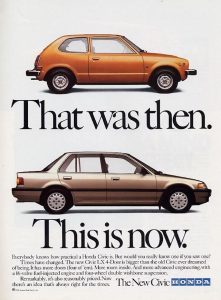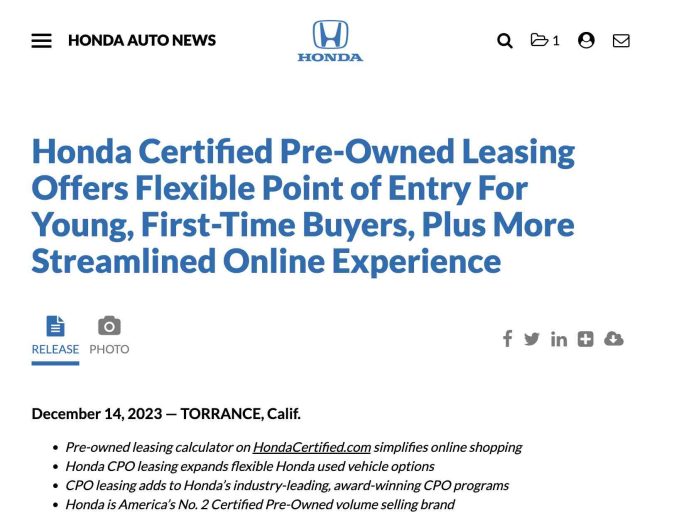People who couldn’t afford a new car used to buy used cars. But used cars have become so expensive that many are beginning to rent them.
Honda now offers leases on “certified, pre-owned” vehicles up to six years old. Because new Hondas cost what a used Acura used to cost just a few years ago. The least expensive new Civic starts just shy of $24k – not counting the taxes, tags and “processing costs.” Not counting the insurance – and the property taxes, in states where they mulct you that way, too.
A $24k car is closer to a $26k car when the incidentals are added up and then there’s the monthly payment – for the insurance, which typically runs a couple hundred per month on a brand-new $24k car (assuming you have a “clean” record, by which is meant you’ve managed to avoid a conviction for “speeding” or some other trumped-up charge that becomes a pretext for further mulcting) in addition to the monthly payment on the loan for the car.
Well, $26k is about 50 percent of the average person’s annual pre-tax income. Before he pays the rent on his apartment (or the rent-in-perpetuity styled property taxes on the home he likes to think he owns).
The Civic used to be a very affordable car. It is now Honda’s entry level car. The distinction is important.
In 1990, the Civic’s base priced was $8,695. Even adjusted for the devaluation of the buying power of the money we’re forced to use by the private banking cartel that bought the government back in 1913, that was still just over $20k back then – in today’s corrupted dollars. In other words, a person who wants to buy a Civic today must have about $4k more to spend than he needed to have back then.
Many haven’t got it.
Let alone the additional dinero they’ll be forced to spend by the insurance mafia that also bought them some government.
And because new car prices are higher, so are used car prices. The latter cost more because there is more demand arising from people priced out of new cars. But there comes a point when people can’t afford the used ones, either – and it looks like we’re there.
A lease on a car is just like leasing an apartment in that you pay to use but do not own. At the end of the rental period, you have exactly nothing to show for what you spent. You will own nothing.
Will it make you happy?
What it will do is paper over the fact that people are being priced out of car ownership – now and ongoing. Honda says that leasing used cars to people who cannot afford to buy a used car “offers flexible point of entry for young, first time buyers,” says the press release.
Except they’re not buyers.
Buyers own things.
Words matter because it is how we think about things. Change the meaning of words and you change the way people think about things. To call someone who rents a buyer is like calling a tax you’re forced to pay a contribution.
“Honda Certified Pre-Owned (CPO) leasing is the latest option for Honda used vehicle shoppers, offering even more choice and a flexible cost of entry into the brand for young and first-time buyers, including an attractive monthly payment and shorter term options. ”
Note the slight change of wording (the above is from the text underneath the headline text quoted in the paragraph prior).
What Honda means is that renting a car entails a lower down-payment cost – because you don’t make a down payment on something you’re not buying. You just make payments.
The inaccurate wording about “first-time buyers” is then repeated.
This isn’t to single out Honda – because it’s not Honda’s fault that its cars have become so costly people – especially young people – can no longer afford to buy them. It is an industry-wide problem that has its roots in government forcing the car industry to build cars with features such as air bags that buyers are (effectively) forced to pay for as well as the compliance costs of building “safe” and “fuel efficient” and “low emissions” cars.
“Safe” not meaning cars that are safe to drive. “Safe” meaning cars that are equipped with the various equipment mandated by government, such as air bags and back-up cameras and tire pressure monitoring systems, among other things. These do not make a car “safer” – that is, less likely to crash. It is an important distinction (and we’re being made to pay for it).
“Fuel efficient” meaning achieves higher city/highway MPG numbers on government tests used to determine compliance with government-mandated MPG minimums. In order to achieve compliance, simpler, less expensive engines without such things as direct injection, turbochargers.cylinder deactivation and 48 volt/hybrid-assist “technology” have been replaced with more expensive “efficient” ones that have such things; less expensive manual transmission have been replaced with more expensive “efficient” automatics that have eight, nine and even ten speeds (and we’re paying for all of that).
“Low emissions” does not mean the car generates less pollution. Not in any meaningful sense. Cars have been nearly zero emissions since the mid-1990s. But the government insists on zero – no matter how much it costs – and never mind that almost-zero is more than enough to eliminate any meaningful issue as regards pollution.
The sum of it all is – people can’t afford all of this. And that’s the lever by which people are being pushed into renting what they used to be able to afford to buy.
. . .
If you like what you’ve found here please consider supporting EPautos.
We depend on you to keep the wheels turning!
Our donate button is here.
If you prefer not to use PayPal, our mailing address is:
EPautos
721 Hummingbird Lane SE
Copper Hill, VA 24079
PS: Get an EPautos magnet or sticker or coaster in return for a $20 or more one-time donation or a $10 or more monthly recurring donation. (Please be sure to tell us you want a magnet or sticker or coaster – and also, provide an address, so we know where to mail the thing!)
If you like items like the Keeeeeeev T shirt pictured below, you can find that and more at the EPautos store!












OT: I clicked on the video recommendation bc the hostess is hot. Turned out to be interesting.
$60000 to replace battery on a $50000 car
https://youtu.be/dr3mFzh0KSk?feature=shared
Mike,
I read some of the comments and not one person discussed the part about the insurance mafia jacking up the guys rates if he files a claim. Sad.
Another drag on first time buyer’s cashflow is taxes. Most older, established citizens have children and mortgages. This means they get very nice tax deductions. Yes, the child tax credit isn’t going to cover the TCO of the kids, but it does make it easier to level up when buying a vehicle.
They also have more credit options available just because they’re likely to have a higher score, and assets they can use as collateral.
This is a big reason why many first cars are hand-me-downs from the parents or grandparents. But if mom and dad are hanging on to the old family truckster, that creates another problem.
Back before Reaganomics and the tax reforms, one could deduct interest payments. This is one reason why that 20% mortgage wasn’t quite as bad as we all might think (although I’m sure it was still pretty painful and I don’t want to downplay it). I think they had to allow an interest deduction since the powers in charge knew full well they were the cause of high interest rates to begin with. My guess is if Powell continues to keep rates “sky high” we’ll see a push to bring back the interest deduction.
The only thing I can stand to read on C&D anymore (their writers are now a motley, talentless crew who collect their payola and write as they’re told by their paymasters) are the old car reviews. One thing stood out on their review of the 1997 F-150:
“Though the new truck isn’t priced at this writing, we can estimate it will be at least 3–5 percent more expensive than the ’96 F150, which ranges from a base of $14,765 for a workman’s-grade model with a V-6 to more than $26,000 for a loaded-up luxo V-8 Eddie Bauer.”
Can’t have that anymore. Now every full-sized truck is larger than a super-duty truck was in the 1990s. It used to be trucks could be TRUCKS. Rough riding, spartan interiors, easy to repair parts, etc. Now that our satanic ruling elite has decided that cars have to go via their long march through the institutions, people who wanted a V-8 and a floaty ride had to go the truck or full-sized SUV route, hence that’s why most trucks now are crew cab country boy Cadillacs. What these people do when even trucks are forced to bend the knee to the regulatory apparatchiks is beyond me.
and I’m grateful for these mega-sized trucks. I longed for the boats of the 70’s since I started driving in the 80’s. Now I have them, finally.
My current one is 20ft long, with a 13ft wheelbase. I love and enjoy it. And it rides ‘almost’ like the old boat floats, but with some level of control superior to the old dogs. yahooooooo.
That quote predated the Dodge Ram half ton pickup redesign of the late 90s turning trucks into expressions of manhood and status. 21st century codpieces.
Prior to that, trucks were about *work*. Men drove them, but I knew a few women who owned F150s and Silverados as well.
Telling:
‘Nippon Steel, Japan’s largest steel production company, announced Monday morning that it will acquire Pittsburgh-based US Steel in an all-cash deal valued at about $14 billion.’ — ZH
In 1900, US Steel became the first US corporation capitalized at over a billion dollars. Five generations later, it’s being sold to Japan — after seventy years of protective tariffs, including those imposed by Trump.
Imperial decline? I rest my case.
Probably the same would happen in auto manufacturing — for instance, Toyota buying out GM. But so uncompetitive are US labor costs, so lackluster is US automotive technology, and so hostile are US regulators, that foreign manufacturers understandably have little interest in grabbing onto the GM and Ford tar babies at any price.
‘Brer Rabbit was sitting on a log combing the tar out of his fur with a wood chip and looking smug. “I was bred and born in the briar patch, Brer Fox,” he called. “Born and bred in the briar patch.”’ — Uncle Remus
“No one ever saw it coming!” – anyone in western Pennsylvania, reflecting on the end of an era.
And they’re right. No one who matters ever thought they’d have to compete with anyone. The skies over Pittsburgh glowed orange all night from the blast furnaces. There were 150 year old brick buildings that ran for a mile along the Little Conemaugh river in Johnstown. They weren’t going anywhere, especially if some Japs thought they were going to play in our playground. We were the best. We beat the Brits by being better at their game. We destroyed the Germans when they became a threat. We had all the resources, right nearby. And we were slightly more motivated than the Soviets, and that’s all that seemed to matter.
Except the Japanese were hungry. And they wanted to make steel. We were happy. We wanted to make money. No one cared when the senior workers would sleep one off on Monday, because the managers were out at Sunnehanna enjoying a 3 martini lunch and a quick 9 with the boys in from Martin Tower on Wednesday. The Japanese didn’t care if you worked yourself into a heart attack, or didn’t see your kids grow up, and certainly didn’t care if you were dumb enough to fall into an open-hearth because the railing wasn’t strong enough.
‘The skies over Pittsburgh glowed orange all night from the blast furnaces.’ — ReadyKilowatt
In the college library where I worked part-time as a student, I found an old cloth-bound, large-format book of AP wire photos from the Forties through Sixties.
One showed a Pittsburgh housewife circa 1951 in her June Cleaver long skirt, vacuuming the steel-mill soot from her white curtains. It was a daily task, she was quoted as saying.
Now we don’t have Pittsburgh housewives vacuuming soot off their curtains. But we don’t have steel mills neither.
And soon, thanks to EPA commissar Michael Regan, electric power plants will go the way of the steel mills. Got candles?
I am a very happy USS share owner today, US Steel will keep its namesake.
X is up over 10 USD today. Life is good, sometimes.
Elbert Gary helped found the company, became chairman of the board.
Elon should be sued.
US Steel would have likely gone down 6 or 7 years ago except for the very small tariffs applied by the Trump Administration. Tariffs are a good tool, but should be strategically applied. Trumps tariffs did prevent 20k people from losing their jobs, but I’m pretty sure Biden removed them. Tariffs also have little to do with capital flows through the capital markets.
I have been actively looking for a winter car/work car for about 3 months. I had a few criteria, mpg had to be good, reliability had to be good, repairability had to be good. It’s been a struggle, I finally last weekend picked up a clean well maintained Honda Civic coupe last weekend, it had 3 strikes, 210k miles on the clock, auto trans, and cop bait red with a spoiler. It replaces a 2003 VW Golf TDI with 240k, a failing auto trans, and a whole lot of noise. 42mpg is great, 4.39/gallon isn’t.
From the last 3 months, I have some observations. First, the $100 car of 1982 became the $500 car of the 90s which became the $1000 car of the 2000s which became the $2500 car of today. Second, the supply is definitely an issue, there is lots of trashed, rusty, seriously bent up junk out there. Third, even well maintained stuff made in the last 20 years is sketchy, they used glitzy tech to make up for the cheapest quality materials and parts they could get away with. The nice leather seats someone paid a premium for are something to avoid since they delaminate and fail after a couple years and a few ten thousands of miles. The multi speed auto trans is a disaster waiting to happen, they do a great job of keeping you in the power and for power and mileage, but they have about 10000 moving parts and cost way more than the car to replace. The engines are all getting higher maintenance, for the same reasons, rubber band cam drives, variable valve timing/cam phaser/variable intake runner arrangements all render a cheap used car mostly a no go.
In short, we’re freaking doomed (tm Mogambo guru). The Honda, even with the VTEC seems like it should be cheap freedom for quite a few more miles. I may have to get fireman plates to offset the cop bait red, sad but we DO live in a tyrannical police state. I do wish it had a 5 speed.
“This isn’t to single out Honda – because it’s not Honda’s fault that its cars have become so costly to people”
I’ll disagree with this statement because there was a time when the car makers could have banded together and said NO. That time is passed, but there was a time when things were just getting started that they could have refused, but didn’t.
Now it is on the buyer to refuse.
I have my daughters 94 Corolla sitting in my driveway as a spare car. Why sell it. I have people coming by now asking me if the car is for sale. There is a demand for cheap transportation that is not being filled by government mandated auto industry.
Where’s the Datsun 1200 when you need one?
https://cars.trovit.com/used-cars/datsun-1200
They are still out there, but it’ll cost ya.
I paid around $23,000 for my 2000 GMC Sierra. That was tax, title, and the stupid dealer fees. This equates to about $41,000 bidenbucks today.
The same package today is $61,000 at the local dealer lot. So there’s a $20,000 delta up front. That doesn’t include al the stupid dealer fees.
Can I afford it? Yes.
Am I going to? hell no.
‘people are being priced out of car ownership – now and ongoing’ — eric
Here’s a troubling thought — what if the inflation-adjusted cost of an $8,695 Honda Civic in 1990 is systematically understated?
Hedonic adjustments for product quality, used in the CPI, are not wrong in principle. For instance, compared to 1990, a contemporary cell phone replaces a landline phone, a Sony Walkman music player, a handheld GPS, a Windows 3.0 personal computer, and more besides. Without hedonic adjustment, today’s inflation-adjusted cost of that grab-bag of gadgets in 1990 would be many thousands.
Trouble is, hedonic adjustment of auto prices counts all the features Eric cites — multiple airbags (symbolic pillows for nesting females), ten-speed automatics, ASS, lower ’emissions,’ back-up cameras, iPad-style Clownscreens in place of manual controls — as ‘improvements’ meriting a subjective reduction of the vehicle price plugged into the CPI.
Eric points out the cumulative effect of this convenient fiction: cars laden with chips, gadgets, and extra weight now are unaffordable to the median household, whose real income is flat at best.
This is the slow-motion tragedy of imperial decline: all the grift raked off for foreign wars, EeeVee subsidies, interest payments on 120%-of-GDP debt, and so forth, eventually makes the average prole f***ing poor. But smile: impoverishing us is a bipartisan program. 🙂
Excellent point. I think the best way to cut through the gubmint BS and lying about pricing of a particular good due to monetary inflation (i.e printing fiat currency) is to do a comparison of MSRP vs. average or median income at the time. That should give a pretty sense of the cost of vehicle now vs. then. Here are my quick and dirty stats from the internet (I have assumed for the sake of the exercise these are true):
In 1990 the msrp of a Honda civic was about $9,000 and the median (not average) household income was about $31,000. That’s 29%.
In 2023 the msrp of a civic is about $26,000 and the median household income is about $75,000 is 34%.
Definitely more expensive, but the latest Civics have really become more like Accords of the past in terms of their size, so that has to account for something (back to hedonics, of course).
Great illustration; thanks. That 5 percent jump in a Civic’s price, versus median income, is big. The same has happened to housing costs, with a vengeance.
Economics becomes a dismal science in a slow-growth, direly-indebted country infested with parasitic grift and aggressive redistribution.
Wait fort Muni property taxes to necessarily skyrocket. All these huge price increases for things (and people) are being paid by every Muni in the US. The kicker is their budgets are always delayed. Wait for it……………..
Yes, hedonic adjustments are a slippery slope. On the bottom end of the spectrum, the options are gone. There are no cars wtihout power windows, seats, a connected audio, wifi system, 15 airbags, saaaaafety avoidance systems,direct injection gasoline engines, hybrid battery systems, etc.
Cars like the Ford Fiesta, The Pontiac Lemans (the 90’s version), the Chevrolet Chevette, and even the entry level Chevy Cavaliers and the Geo Metro. All gone. These cars were about 5-7k base price. And you could get teh base model. A 9k civic? I think that a base civic in 1990 was about 7600.
Still gone.
$75k median household income. Increasingly funneled into “high yield” 401k port a potties.
What sorta investments are “high yield” ? Burger King, Toyota etc. I think NOT.
How does this scenario bode for any pssoble future ?
Happy monday slaves. . .
I don’t know. Hedonic adjustments or not, a smart phone could be had 10 years ago for around $200-300. They would do the same thing as the ones out now do except with perhaps a less flashy screen and shorter “battery life” The thing is, now an I phone is close to $1500 and a Samsung SXX is roughly $1000. That is an over 3x increase in cost.
In the early smart phone days, batteries were replacable. Now the entire phone is disposable. You might get 4 years instead of 2 out of the battery.
$1500 will buy a lot of walkmans, TVs and landlines.
We are getting ripped off, especially over the last 5 years.
Thing is, no one pays full price for an iPhone. I upgraded this year, got ~$600 for my trade and got a phone that isn’t quite exponentially better but more than an incremental improvement. If I had gone through a carrier instead of buying direct from Apple I would have gotten an even better deal, especially if I had changed carriers. I tend to keep phones for at least two years so I don’t know that I’ll need to be concerned if the battery starts to go south.
Plus, I tend to take care of my phones. Always in a pretty good case, keep the battery charged up, and don’t throw them around. I know plenty of people who break screens every six months (don’t put it in your back pocket!), drain the battery down to the red zone and let them overheat on the dashboard. The battery is the least of their problems.
I get it, picking on cell phones is easy for all the greybeards. But most of your complaining has to do with the apps and how people use them, not what they actually are. I can’t imagine not having a camera with me all the time. I have all my music, podcasts and a handy voice recorder available everywhere. Now I have an emergency beacon too, so I sold my Inreach and dropped the $14/month fee. With the addition of USB-C (finally) I can plug in a $20 dongle that will let me attach to a monitor, keyboard and mouse to do basic computing anywhere there’s a desk. Or play games, write up annoying posts on blogs, or control a drone. All for the cost of a few hours’ work.
And if you want to go with a Google phone it’s even cheaper or even still free, but you have to be willing to put up with (more) spying. Because there’s no free lunch, and you get what you pay for.
I get it, sometimes it’s hard to dump a “performing asset” but they aren’t going to get any more valuable over time. Might as well dump it on to the next guy before it becomes a liability. Or put it away and wait 35 years to see if anyone gets nostalgic for it, but it better be pristine.
The CIA, NSA and the rest of our illustrious Gestapo agencies thank you for your participation to make their jobs easier. 🙂
When? When will the shoe drop? If you’re reading this put me out of my misery, please!
As far as I can tell they need us out in the wild, paying their salaries (or at least backing the bonds they use to pay themselves). And I don’t think the three letter agencies know much about keeping refineries running, producing electricity, or even protecting computer networks from foreign interlopers. The parasite requires a host.
When “android” comes outa the faraday bag in the morning and autoboots into a 10 minute mandatory security update.
Get the message meatsack ?
Ya thats some fn upgrade alright.
$0 is a most excellent price. Life was just fine in the before times. Always seemed to manage without one. What changed? Only societal pressure. Nothing more. Well, maybe the deletion of pay phones. Pay phones could support anonymity. Can’t have that now, can we?
Well unfortunately I do have some grey in my beard, but I really don’t see any way the average life has been improved by the cell phone/smart phone. Yes there are apps, yes it is nice to be able to access the internet anytime/anywhere.
But the social pathologies associated with them aren’t worth it. Little electronic attention whores, allowing people to be intravenously drip fed with the most dangerous and destructive narcotic ever developed, social media.
I’m looking forward to the day I no longer need mine for my service business. On that day it will get wedged in my trap thrower and launched into one single glorious final valid use, as a moving target.
Your mileage, of course, may vary.